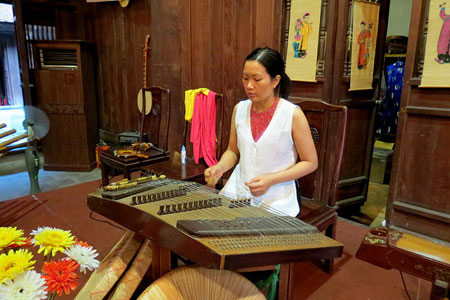The 36-string zither is a percussion instrument. It has the shape of an isosceles trapezoid, with a slightly convex sound board made of light, porous, unvarnished wood.

The bridges and sides are made of hardwood. The bottom is flat. There are two staggered lines of 18 bridges on the sound board. The bridges on the left have hooks to which the strings are attached; those on the right have pegs for tuning. The strings are of metal.
Those on the left, numbering 18, are tuned as follows: C, D, E, F-sharp, G-sharp, A-sharp, C1, D1, El, F-sharp 1, G-sharp 1, A-sharp I, C2, D2, E2, F-sharp 2, G-sharp 2, A sharp 2.
The 18 strings on the right are tuned as follows: C-sharp, D-sharp, F, G, A, B, C-sharp 1, D-sharp 1, FI, GI, Al, B1, C-sharp 3, D-sharp 2, F2, G2, A2, B1.
The range of the instrument covers three octaves from C to B2. The strings are struck with two thin flexible bamboo sticks tipped with felt.
The playing technique includes a quick run, vibrato, stopping, and pressing. The tones are bright and merry and the notes of an arpeggio can be played in swift succession or simultaneously.
The instrument plays an important role in the band accompanying cheo and cai luong operas. The 36-string zither can be played to accompany instrument solos, singing, or as part of an orchestra. Recently, more strings have been added so that all semi-tones can be played.